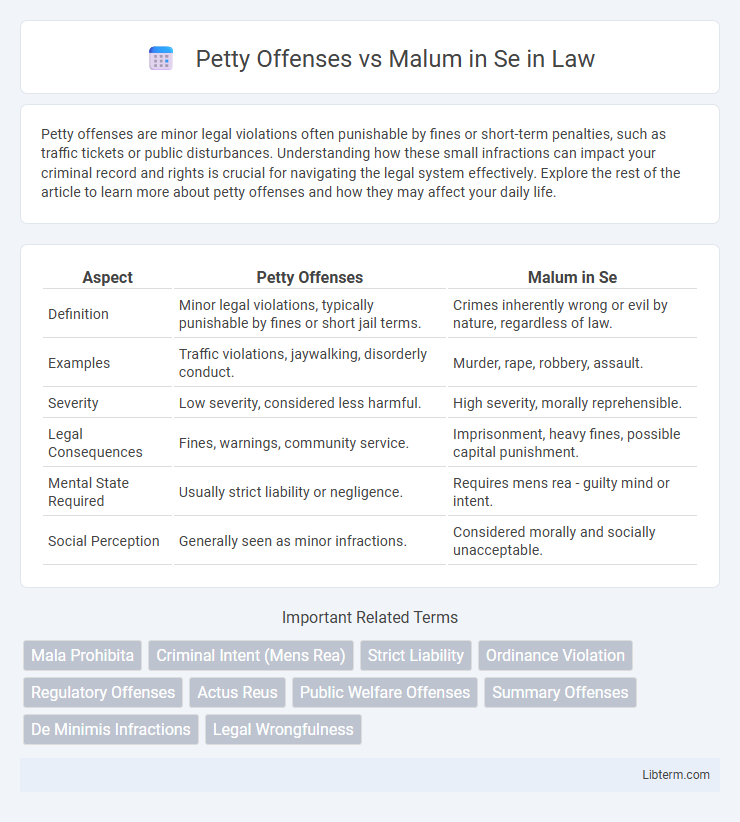Petty offenses are minor legal violations often punishable by fines or short-term penalties, such as traffic tickets or public disturbances. Understanding how these small infractions can impact your criminal record and rights is crucial for navigating the legal system effectively. Explore the rest of the article to learn more about petty offenses and how they may affect your daily life.
Table of Comparison
| Aspect | Petty Offenses | Malum in Se |
|---|---|---|
| Definition | Minor legal violations, typically punishable by fines or short jail terms. | Crimes inherently wrong or evil by nature, regardless of law. |
| Examples | Traffic violations, jaywalking, disorderly conduct. | Murder, rape, robbery, assault. |
| Severity | Low severity, considered less harmful. | High severity, morally reprehensible. |
| Legal Consequences | Fines, warnings, community service. | Imprisonment, heavy fines, possible capital punishment. |
| Mental State Required | Usually strict liability or negligence. | Requires mens rea - guilty mind or intent. |
| Social Perception | Generally seen as minor infractions. | Considered morally and socially unacceptable. |
Introduction to Petty Offenses and Malum in Se
Petty offenses are minor legal violations typically punishable by fines or short-term incarceration, often involving acts like traffic infractions or minor theft. Malum in se offenses refer to crimes that are inherently wrong or evil by their nature, such as murder, rape, or arson, recognized universally as morally reprehensible. The key distinction lies in the severity and moral judgment of the act, with petty offenses lacking the intrinsic immorality that characterizes malum in se crimes.
Defining Petty Offenses: Legal Perspective
Petty offenses are minor legal violations punishable by fines or short-term incarceration, distinguished from more serious crimes like malum in se which are inherently wrong and morally reprehensible. These offenses typically include minor traffic violations, public disturbances, and petty theft, reflecting regulatory infractions rather than ethical violations. In criminal law, the classification of petty offenses impacts court procedures, sentencing, and the burden of proof required for conviction.
What Does Malum in Se Mean?
Malum in se refers to actions that are inherently wrong or evil by their very nature, such as murder or theft, recognized universally across legal systems. These offenses are contrasted with petty offenses, which are minor violations like traffic infractions or public intoxication, considered wrong primarily because they are prohibited by law. Understanding malum in se helps distinguish serious crimes from less severe infractions based on the inherent morality of the act itself.
Key Differences Between Petty Offenses and Malum in Se
Petty offenses are minor legal violations typically punishable by fines or short-term penalties, whereas malum in se crimes are inherently evil acts, such as murder or theft, morally wrong by nature. Petty offenses often involve regulatory infractions or traffic violations, reflecting societal norms rather than moral culpability. Malum in se offenses carry a higher degree of moral blameworthiness and usually result in more severe legal consequences.
Historical Origins of Both Legal Concepts
Petty offenses originate from common law traditions, classified as minor infractions with lesser penalties, emphasizing societal order rather than moral judgments. Malum in se offenses date back to ancient Roman law and natural law philosophy, denoting inherently immoral crimes such as murder or theft, universally condemned across cultures. These historical roots illustrate a fundamental legal distinction between offenses based on moral turpitude and those established by statutory regulation.
Common Examples of Petty Offenses
Petty offenses, often classified as minor infractions such as traffic violations, littering, and jaywalking, differ significantly from malum in se crimes, which are inherently evil acts like murder or theft. These minor offenses usually incur fines or short-term penalties rather than imprisonment. Understanding the distinction aids in legal categorization and influences the severity of judicial consequences.
Typical Crimes Classified as Malum in Se
Typical crimes classified as malum in se include murder, rape, robbery, and arson, which are inherently wrong due to their violation of fundamental moral principles. These offenses are universally condemned regardless of specific statutes because they cause significant harm and threat to societal order. In contrast, petty offenses involve minor infractions such as loitering or disorderly conduct, which lack the deep moral turpitude characteristic of malum in se crimes.
Legal Consequences and Penalties
Petty offenses typically involve minor violations such as traffic tickets or disorderly conduct, resulting in fines, community service, or short-term imprisonment, reflecting their lower severity. Malum in se crimes, including murder, rape, or theft, carry more severe penalties like lengthy imprisonment or capital punishment due to their inherently wrongful nature. Legal consequences for malum in se offenses often include enhanced sentencing and harsher judicial scrutiny, distinguishing them significantly from the lenient treatment of petty offenses.
Societal Impact of Each Offense Type
Petty offenses typically involve minor violations that cause limited societal harm, often resulting in fines or short-term penalties, which maintain public order without significant disruption. In contrast, malum in se crimes represent inherently evil acts, such as murder or arson, generating profound societal impact through fear, loss, and a demand for severe justice measures. The societal response to malum in se offenses emphasizes deterrence and rehabilitation to protect communal values and safety more robustly than the response to petty offenses.
Conclusion: Importance of Distinguishing Both Terms
Distinguishing petty offenses from malum in se crimes is crucial for accurate legal classification and appropriate sentencing. Petty offenses, often minor and regulatory in nature, contrast sharply with malum in se offenses, which are inherently wrong and morally reprehensible. Understanding this distinction ensures the justice system applies proportional penalties and upholds legal and ethical standards effectively.
Petty Offenses Infographic

 libterm.com
libterm.com